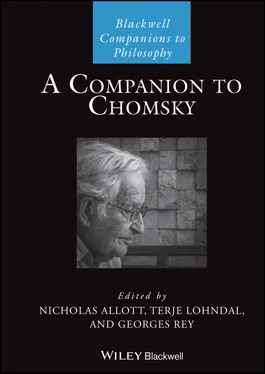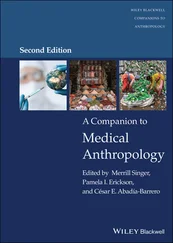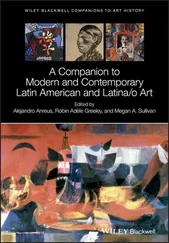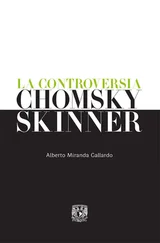A Companion to Chomsky
Здесь есть возможность читать онлайн «A Companion to Chomsky» — ознакомительный отрывок электронной книги совершенно бесплатно, а после прочтения отрывка купить полную версию. В некоторых случаях можно слушать аудио, скачать через торрент в формате fb2 и присутствует краткое содержание. Жанр: unrecognised, на английском языке. Описание произведения, (предисловие) а так же отзывы посетителей доступны на портале библиотеки ЛибКат.
- Название:A Companion to Chomsky
- Автор:
- Жанр:
- Год:неизвестен
- ISBN:нет данных
- Рейтинг книги:3 / 5. Голосов: 1
-
Избранное:Добавить в избранное
- Отзывы:
-
Ваша оценка:
- 60
- 1
- 2
- 3
- 4
- 5
A Companion to Chomsky: краткое содержание, описание и аннотация
Предлагаем к чтению аннотацию, описание, краткое содержание или предисловие (зависит от того, что написал сам автор книги «A Companion to Chomsky»). Если вы не нашли необходимую информацию о книге — напишите в комментариях, мы постараемся отыскать её.
Companion
Companion
A Companion to Chomsky
A Companion to Chomsky — читать онлайн ознакомительный отрывок
Ниже представлен текст книги, разбитый по страницам. Система сохранения места последней прочитанной страницы, позволяет с удобством читать онлайн бесплатно книгу «A Companion to Chomsky», без необходимости каждый раз заново искать на чём Вы остановились. Поставьте закладку, и сможете в любой момент перейти на страницу, на которой закончили чтение.
Интервал:
Закладка:
In The Sound Pattern of English (Chomsky and Halle 1968, henceforth SPE ) and most phonological models, this difference consists of two factors, a representational difference and a computational difference:
Québec French has the same vowel stored in the representations of petit and petite, say /i/, and a mental computation turns /i/ into [I] in a closed syllable. The difference in pronunciation is a result of a specific computation.
English has different vowels stored in the representations of beet and bit. The stored representational (featural) distinction persists in pronunciation.
The phonology of each language consists of various computations. In SPE the computations are called rules, and the phonology of a language is a complex function resulting from composing the rules in a particular order. The input to the phonology is called an underlying representation, and the output is called a surface representation or, somewhat confusingly, a “phonetic representation.” The mapping of an underlying form to a surface form by the computational system is called a derivation. It is the output of the derivation, the “phonetic” form, that is the input to the mechanisms leading to speech, and this output form should not be confused with the actual articulatory movements and their concomitant acoustic results.
6.2 Internalism in Phonology
Our simple example from Québec French allows us to discuss one of the most important notions of SPE phonology, and Chomsky's linguistics more generally: radical internalism. The input representations referred to above consist of morphemes, minimal data structures containing (at least) semantic and phonological information. Under the internalist perspective, these morphemes are encoded as (or, just are) information in the minds/brains of speakers. They are not in books, in the air, or anywhere out in the world as properties of speech communities. When we informally refer to speakers of ‘Québec French’ or ‘English’ we assume an idealized population that is identical in all ways relevant to the phenomenon under discussion, say having type‐identical vowels in type‐identical morphemes in their lexicon. 1 So, the internalism that is standard in other aspects of Chomsky's linguistics, and is in fact the most profound consequence of the cognitive revolution of the 1950s and 1960s, is equally relevant to Chomsky's phonology.
According to the discussion on p. 3 of SPE , language is taken to be a system of knowledge that is fully internal to the human mind: “The person who has acquired knowledge of language has internalized a system of rules that determines sound‐meaning connections for indefinitely many sentences.” This “for the most part, obviously, unconscious knowledge,” which is “realized physically in a finite human brain”, is referred to as “the speaker‐hearer's competence,” and it should be strictly distinguished from “performance,” that is, from “what the speaker‐hearer actually does” with this knowledge on a particular occasion. The general goal of linguistics “is the construction of a grammar,” where grammar refers to “the explicit theory constructed by the linguist and proposed as a description of the speaker's competence.” Of course, competence cannot be observed directly. Its properties can only be discovered indirectly, for example by inferring them on the basis of evidence provided by performance. Since performance “is a complex matter that involves many factors,” this main body of empirical data from which phonological conclusions can be drawn will necessarily include a welter of accidental and irrelevant information. A universal phonological theory provides a principled basis for distinguishing between relevant and irrelevant aspects of empirical data, as in all sciences.
Consistent with this internalism, we see that, just as in syntax, Chomsky's phonology, as presented in SPE itself and many of the papers leading up to the book (Chomsky 1951, 1957b,a, 1964b; Chomsky et al. 1956; Halle 1959, 1962, 1964; Chomsky and Halle 1965), considers the actual object of study to be the cognitive system (phonological competence) that underlies observable behavior (speech production and perception). Observable behavior is just one source of evidence for competence.
Despite the clarity and coherence of SPE 's radical cognitivism, much subsequent work in phonology has ignored or rejected internalism to varying degrees. As we'll see, much of the literature fails to engage with the philosophical foundations of the cognitive revolution, and has been preoccupied with describing verbal behavior, rather than the underlying knowledge that makes that behavior possible. These preoccupations have maintained or even gained in popularity from the time of the publication of SPE up until the present, as witnessed by the prominence of “output‐driven” models of phonology (e.g., Tesar 2014) and by the prevalent orientation toward “the surface” throughout the field.
Of course, most scholars accept that some aspects of language are “in the mind,” but the Chomskyan perspective is that language, phonology included, is all in the mind. Linguistic mental representations are the constituents of language, and are not understood as “representing” mind‐external entities. For example, Chomsky (2009a, p. 27) proposes that for surface phonological (phonetic) entities “such as the syllable /ba/; every particular act externalizing this mental entity yields a mind‐independent entity, but it is idle to seek a mind‐independent construct that corresponds to the syllable.” This perspective, not only for phonology, but also for syntax and semantics, is endorsed by many scholars, including Jackendoff (1992), who says “Language, as far as I can tell, is all construction,” meaning “all internal construction.”
Aside from internalism, naturalism and nativism are the most important notions of Chomsky's legacy in linguistics. These notions don't just apply to phonology as to syntax; rather it is also the case that Chomsky's consistent and radical versions of these notions can even be justified with phonological examples. As phonologists, we regret that the phonological arguments are not as well known as the syntactic ones. For the purposes of this brief discussion, we focus on the relationship between internalism and nativism.
6.3 Anti‐Internalism and Rejection of Nativism
SPE is explicit in its commitment to nativism:
The significant linguistic universals are those that must be assumed to be available to the child learning a language as an a priori, innate endowment. That there must be a rich system of a priori properties—of essential linguistic universals—is fairly obvious from the following empirical observations. Every normal child acquires an extremely intricate and abstract grammar, the properties of which are much underdetermined by the available data. This takes place with great speed, under conditions that are far from ideal, and there is little significant variation among children who may differ greatly in intelligence and experience. The search for essential linguistic universals is, in effect, the study of the a priori faculté de langage that makes language acquisition possible under the given conditions of time and access to data.
It is useful to divide linguistic universals roughly into two categories. There are, first of all, certain “formal universals” that determine the structure of grammars and the form and organization of rules. In addition, there are “substantive universals” 2 that define the sets of elements that may figure in particular grammars. [p. 4]
Despite these clear statements, nativism has fared badly in the phonological literature in recent years, and we'll discuss two influential trends. Optimality Theory (OT) (e.g. Prince and Smolensky 1993; McCarthy and Prince 1993) began as a strongly nativist model of phonology, consisting of an innate constraint set, built on an inventory of substantive universals, such as the subsegmental features used in SPE . In OT, a universal algorithm determines the output form for a given phonological input based on a language‐specific ranking. In OT, then, the only locus of language variation is in the ranking of the universal constraints in a given language  and the set of morphemes that happen to be present in the lexicon of
and the set of morphemes that happen to be present in the lexicon of  (although there is some confusion with respect to the latter issue, represented in discussion of the so‐called Richness of the Base). For example, an underlying /i/ is able to surface in a closed syllable in English [bit] “beet,” but not in Québec French [pt sIt], despite the two languages having the same constraints, because the two differ in their constraint ranking.
(although there is some confusion with respect to the latter issue, represented in discussion of the so‐called Richness of the Base). For example, an underlying /i/ is able to surface in a closed syllable in English [bit] “beet,” but not in Québec French [pt sIt], despite the two languages having the same constraints, because the two differ in their constraint ranking.
Интервал:
Закладка:
Похожие книги на «A Companion to Chomsky»
Представляем Вашему вниманию похожие книги на «A Companion to Chomsky» списком для выбора. Мы отобрали схожую по названию и смыслу литературу в надежде предоставить читателям больше вариантов отыскать новые, интересные, ещё непрочитанные произведения.
Обсуждение, отзывы о книге «A Companion to Chomsky» и просто собственные мнения читателей. Оставьте ваши комментарии, напишите, что Вы думаете о произведении, его смысле или главных героях. Укажите что конкретно понравилось, а что нет, и почему Вы так считаете.












